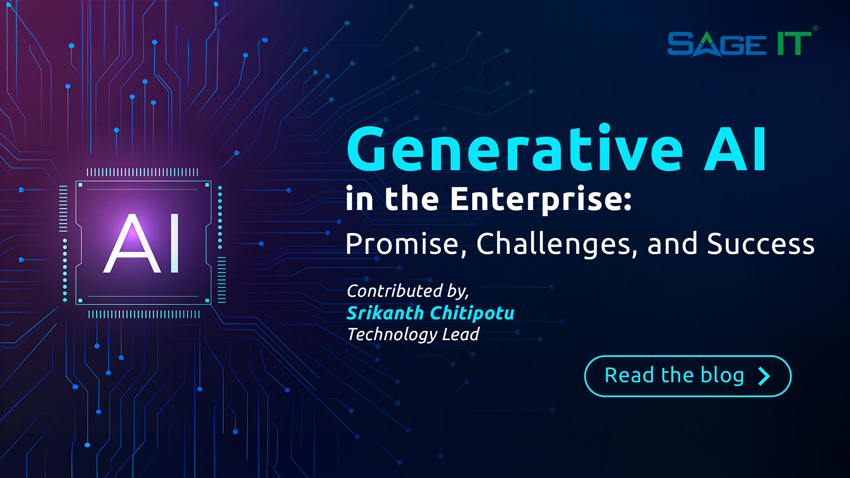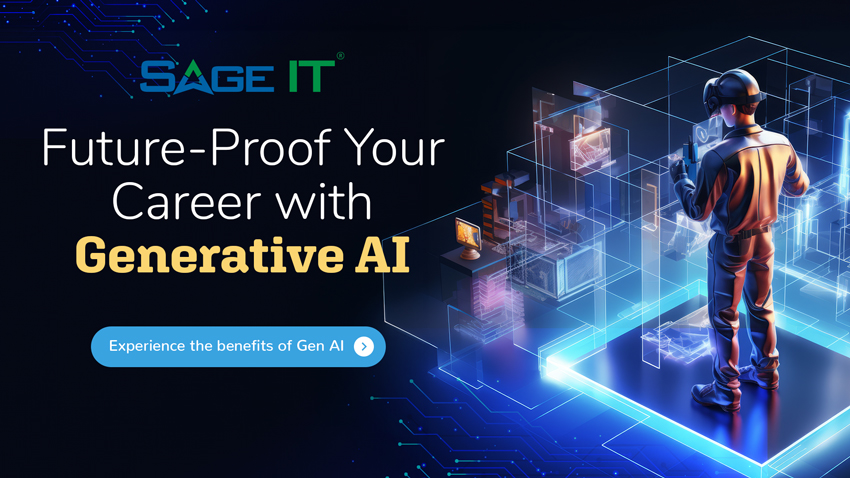
Generative AI in the Enterprise: Promise, Challenges, and Success
The business landscape is constantly evolving, and the latest buzzword shaking things up is “Generative AI.” We’re not just talking about AI that crunches numbers, but AI that creates—think automated marketing copy, hyper-realistic product images, even functional lines of code. But here’s the problem: many enterprises are either paralyzed by the fear of missing out (FOMO) or diving headfirst into AI without a clear strategy. That’s a recipe for wasted resources, missed opportunities, and a whole lot of frustration.
But hold on, there’s good news! Generative AI isn’t just another tech trend; it’s a game-changer. The opportunity for enterprises is massive: streamline operations, turbocharge creativity, and unlock new avenues for growth.
In this post, we’re cutting through the hype and getting down to brass tacks. We’ll explore the real-world promise of Generative AI for enterprises, delve into the very real challenges you’ll face, and most importantly, lay out a roadmap for success. Whether you’re an AI newbie or have already dipped your toes in the water, this guide is your compass for navigating the exciting (and sometimes treacherous) terrain of Generative AI.
The Promise of Generative AI in the Enterprise
Generative AI offers a transformative potential for enterprises, promising to reshape how work is done and value is created.
Increased Efficiency and Productivity
Generative AI automates tedious, repetitive tasks, freeing employees for higher-value activities. Chatbots handle customer inquiries, AI-powered tools generate marketing copy with a proven increase in productivity of up to 30%, and algorithms streamline data analysis, accelerating workflows and reducing operational costs by an average of 15%.
Enhanced Creativity and Innovation
Generative AI serves as a creative partner, sparking new ideas and pushing the boundaries of innovation. It generates novel product designs, crafts engaging marketing campaigns that have shown a 10-15% increase in click-through rates, and facilitates brainstorming sessions, empowering teams to explore uncharted territories.
Improved Decision-Making
By synthesizing vast amounts of data and generating actionable insights, Generative AI empowers decision-makers with a comprehensive understanding of complex issues. Studies have shown that AI-powered decision support systems can improve decision accuracy by up to 15-20%. This informed decision-making leads to smarter strategies, optimized resource allocation, and ultimately, better business outcomes.
New Revenue Streams and Business Models
Generative AI opens doors to previously untapped revenue streams. Enterprises can leverage AI-generated content to create personalized customer experiences, offer tailor-made products, and deliver targeted services, fostering customer loyalty and driving revenue growth. Early adopters have reported a 10% increase in customer satisfaction and a 5% uplift in revenue after implementing Generative AI solutions.
Real-World Examples of Successful Implementation
Numerous enterprises are already reaping the benefits of Generative AI. For instance, in healthcare, AI models are generating personalized treatment plans, while in finance, algorithms are identifying investment opportunities with a success rate 20% higher than traditional methods. Marketing teams are utilizing AI to craft compelling narratives, and software developers are relying on AI to write code, reducing development time by as much as 40%.
These are just a few of the ways Generative AI is transforming enterprises, promising a future where businesses are more efficient, innovative, and customer-centric.
Challenges Facing Generative AI in the Enterprise
Despite its promise, implementing Generative AI in the enterprise is not without hurdles. Organizations must navigate several challenges to fully unlock its potential.
Bias and Fairness
AI models can inadvertently perpetuate and amplify existing biases present in training data. This can lead to discriminatory outcomes, raise ethical concerns, and damage an organization’s reputation. Ensuring fairness and mitigating bias is crucial for responsible AI deployment.
Security and Privacy
Generative AI models often process sensitive data, making them vulnerable to security breaches and privacy violations. Robust security measures are essential to protect data from unauthorized access, misuse, or theft. Generative AI model that is used in direct customer interactions can be made to imitate new personas by the end customers and this will result in Enterprises losing confidence in leveraging this ground-breaking new technology.
Integration with Existing Systems
Integrating Generative AI with legacy systems and workflows can be complex and time-consuming. Organizations must ensure seamless communication and data exchange between AI models and existing infrastructure to maximize value. Patterns of integration with a conversational system differ greatly with some of the existing traditional systems. This new pattern requires thinking out of the box as to how the flow of information would happen and where/when the conversations can be integrated into rest of the technical ecosystem.
Talent and Skills Gap
The successful implementation of Generative AI requires a specialized skill set that is often in short supply. Organizations need data scientists focused on NLP, machine learning engineers, and AI ethicists to build, deploy, and manage AI models effectively.
Cost and ROI
Generative AI can be expensive to implement and maintain. The costs of data acquisition, model development, infrastructure, and talent can be significant. Organizations must carefully evaluate the potential return on investment (ROI) to justify the expenditure.
Regulatory Landscape
As Generative AI technologies evolves at a rapid pace, so too does the regulatory landscape surrounding their usage. Enterprises must stay abreast of emerging regulations and standards to ensure compliance and mitigate legal risks associated with AI deployment.
Addressing these challenges is crucial for enterprises to realize the full benefits of Generative AI. By implementing best practices, investing in talent, and prioritizing ethical considerations, organizations can overcome these hurdles and pave the way for a successful AI-powered future.
Data Quality and Availability
Generative AI models thrive on massive volumes of high-quality data. However, many enterprises struggle with incomplete, inconsistent, or biased data, hindering the models’ ability to generate accurate and reliable outputs.
Overcoming Challenges and Achieving Success
While the challenges of Generative AI are substantial, they are not insurmountable. By adopting a strategic approach and following best practices, enterprises can harness the transformative power of this technology.
Best Practices for Implementation
- Start with a clear business case. Identify specific use cases where Generative AI can deliver the most value, aligning with strategic goals.
- Focus on integration & data quality. Think about how Generative AI will be integrated into the landscape. If Generative AI model is leveraged as a conversational agent to work alongside, sufficient thought should be given to understand how those interactions are stored for review and post feedback. Invest in data collection, cleaning, and labelling processes to ensure accurate and reliable AI outputs.
- Choose the right model. Select the Generative AI model that best suits your specific needs and use case. Bigger model is not always better for a given use case.
- Iterate and refine. Continuously monitor and evaluate model performance, making adjustments as needed to optimize results.
Strategies for Mitigating Risks
- Address bias head-on. Proactively identify and mitigate biases in data and algorithms to ensure fairness and equity.
- Prioritize security and privacy. Implement robust security measures to protect sensitive data and prevent unauthorized access.
- Establish ethical guidelines. Develop clear guidelines for the responsible use of AI, taking into account ethical considerations and potential societal impacts.
Building a Strong Foundation for AI
- Invest in infrastructure. Ensure adequate computing power, storage, and networking capabilities to support AI workloads.
- Foster a data-driven culture. Encourage data literacy and promote a culture of experimentation and learning within the organization.
- Partner with experts. Collaborate with AI specialists and technology providers to leverage their expertise and accelerate your AI journey.
Investing in Talent and Training
- Recruit AI specialists. Attract and retain top talent in data science, machine learning, and AI ethics.
- Upskill existing workforce. Provide training and development opportunities to equip employees with the necessary AI skills.
- Promote cross-functional collaboration. Encourage collaboration between IT, business, and legal teams to ensure a holistic approach to AI implementation.
Change Management
- Communicate transparently. Clearly communicate the goals, benefits, and potential impacts of Generative AI to all stakeholders, addressing concerns and building trust.
- Involve employees in the process. Engage employees in the design and implementation of AI solutions, soliciting their feedback and ideas.
- Provide training and support. Offer comprehensive training programs to help employees adapt to new workflows and roles, ensuring a smooth transition.
- Monitor and adapt. Continuously monitor the impact of AI on employees and workflows, making adjustments as needed to minimize disruptions and maximize benefits.
Measuring and Evaluating Success:
- Define clear metrics. Establish measurable goals and KPIs to track the impact of Generative AI on business outcomes.
- Monitor performance continuously. Regularly assess model accuracy, efficiency, and ROI to identify areas for improvement.
- Celebrate successes. Recognize and reward teams for their contributions to AI-driven innovation and value creation.
By following these strategies, enterprises can overcome the challenges of Generative AI and pave the way for a successful AI-powered future.
Conclusion
Generative AI stands as a game-changer for enterprises, promising unprecedented efficiency, innovation, and growth. While challenges like data quality, bias, and integration exist, they are surmountable through strategic planning and best practices. By starting small, investing in talent and infrastructure, collaborating with experts, and embracing experimentation, businesses can harness Generative AI’s transformative power. With a clear vision and responsible AI practices, enterprises can unlock a future of unparalleled success in this new era of intelligent automation and creativity.
Don’t get left behind in the AI revolution. Let us show you how Generative AI can streamline your operations, boost creativity, and unlock new revenue streams. Contact us now to request a demo and see the impact AI can have on your business.
Contributed for Sage IT by,
Srikanth Chitipotu
Technology Lead
If you have any further questions or need assistance, feel free to reach out to us at [email protected]










